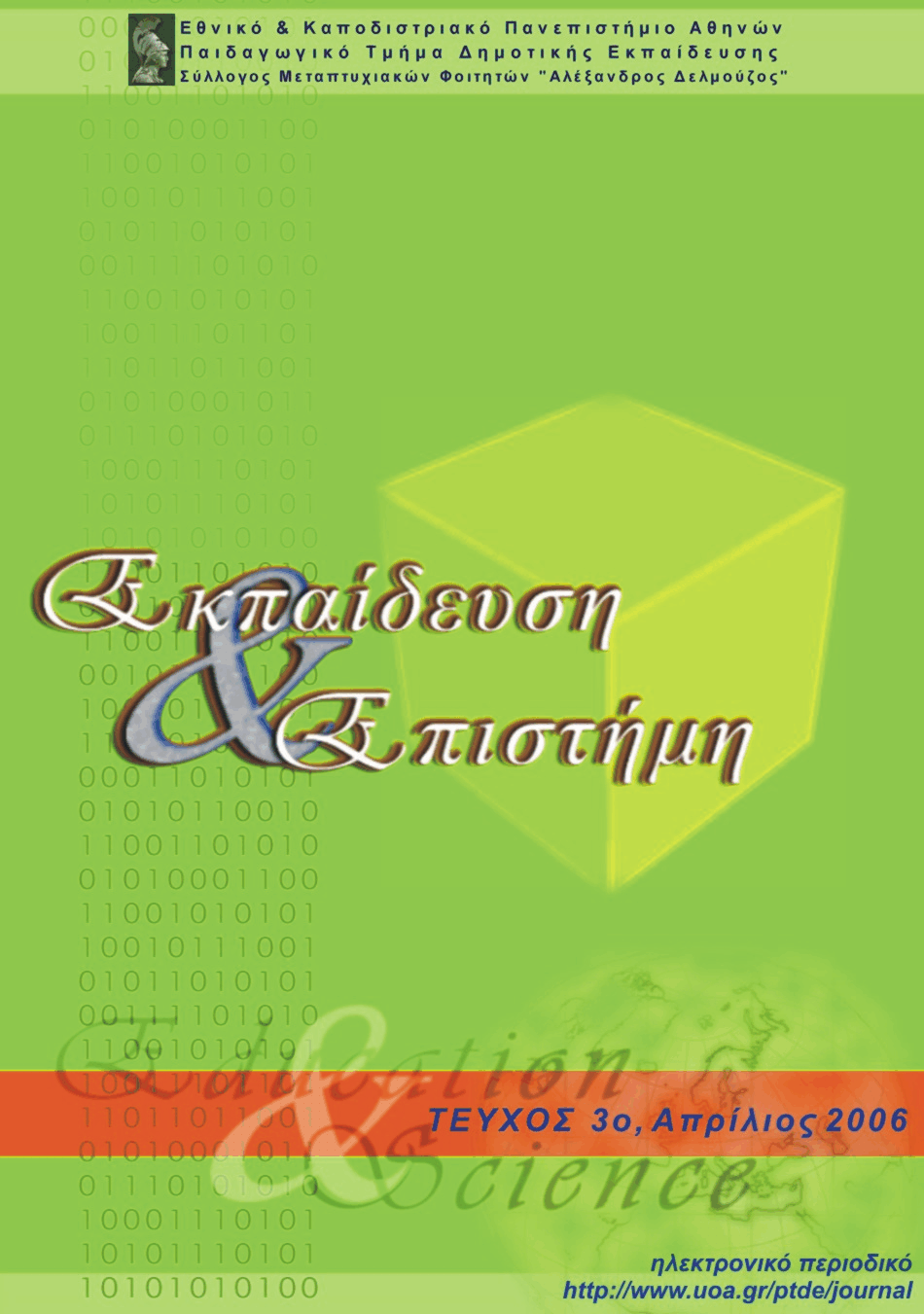
 |
Education & Science | ||
| VOLUME I, Issue 3 | |||
| April 2006 | |||
|
|
|||
|
Introductory teacher training course: the internal evaluation of an effort |
pp. 257 - 273 |
|||||
| Achilleas Kapsalis, Konstantinos Robidis | ||||||
Abstract |
||||||
In this article the introductory
training course of the newly appointed teachers in Primary and Secondary
Education is attempted to be evaluated. The training discussed was
realized in the 1st Regional Training Centre of Thessaloniki
in the academic year 2003-04. |
||||||
Full Text [Note: in
Greek]: |
|
|
|
|
|
|
|||
|
Migration Policy Concerns in Greece and Europe |
pp. 274 - 287 |
|||||
| Souzanna Maria Nikolaou, Leda Stergiou | ||||||
Abstract |
||||||
Immigration has emerged as a separate sector in the European Union policy, which is requested to confront certain issues such as the demographic decline, the retirement system, legal and illegal migration and so on. Actual problems of the society (e.g. the degradation of the Welfare State) are often associated with the stigmatization of immigrants causing a shift of the public viewpoint towards a more xenophobic attitude. This also becomes evident in the migration policies adopted by the European countries. For the avoidance of xenophobic attitudes that are against the immigrants and their social integration what is required is the international cooperation aiming at the formation of a new citizenship. The European citizen of 21st century should share individual, social and political rights, based on dignity, freedom, equality and justice. |
||||||
Full Text [Note: in
Greek]: |
|
|
|
|
|
|
|||
|
Evaluation of a hypermedia e-learning web tool: A case study in lifelong learning actions |
pp.
288 - 301 |
|||||
| Fotis Lazarinis | ||||||
Abstract |
||||||
TThis
paper presents a
hypermedia
Web system
for creating and managing learning material. The educational data is
structured
on
categories that can be easily accessed and studied.
Creation of lessons is
based on filling and connecting templates with raw educational data.
Then it presents cases of utilizing the system in
lifelong learning actions and it documents its positive and negative
aspects, as they result from educators and learners. The main objective
of our work is the assessment of the system’s usability
and the identification of factors which
increase the acceptance of learning management systems by educators and
learners. |
||||||
Full Text [Note: in
Greek]: |
|
|
|
|
|
|
|||
|
Education for Democratic Citizenship within the Multicultural Societies of Europe: A View from England |
pp. 302 - 312 |
|||||
|
Ioannis M. Fragkoulis |
||||||
Abstract |
||||||
This paper aims to examine issues relating to Citizenship Education in England. Compared to other European countries it took England a long time and a huge debate before finally Citizenship Education was formally introduced in the formal curriculum. The paper is divided in two parts: the first serves as an “introduction” to the current multicultural status of England and to the implications for Democratic Citizenship while the second focuses solely on Citizenship Education and its current status in England. |
||||||
Full Text: |
|
|
|
|
|
|
|||
|
Physical education teacher as factor of change and innovation |
pp. 313 - 323 |
|||||
| Athanasios Kolovelonis | ||||||
Abstract |
||||||
The purpose of the present study was to investigate the role which can play the physical education teacher as factor of educational change and innovation in school physical education. First, basic kinds of educational change and its drawbacks were presented critically in search of the factors that can contribute to the success of the change. In addition, the role of the physical education teacher in the process of the educational change was examined. Finally, specific strategies which can help physical education teacher in his attempt to be a basic factor of educational change and improve his status as teacher were proposed. |
||||||
Full Text [Note: in
Greek]: |
|
|
|
|
|
|
|||
Book
Review |
pp. 324 - 328 |
|||||
| Stavriana Soubassi | ||||||
Abstract |
||||||
|
The aim of this paper is to present the latest electronic publication of Dr. Georgi Lozanov, Psychiatrist and founder of Suggestology. This presentation has been long due in Greece, where the 40-year long, cross-disciplinary research work of Dr. Lozanov and Dr. Evelyna Gateva, Psychopedagogue, in the field of the Psychology of Learning and the activation of man’s reserve mental capacities with the aid of adapted suggestopedic Art, is still unknown. The better known, repeatedly revised product of their research work is "Suggestopedia" - a design for integrated teaching, aiming as well at the integration of the personality of the learners. To achieve this harmonious optimization of learning, they have relied on a model of communication which assigns great importance to subconscious and unconscious messages, peripheral perception and affective factors. The experimental application of Suggestopedia at state schools in Sofia was evaluated by U.N.E.S.C.O. experts in 1978 and it was deemed a much promising tool in combating illiteracy, while it was proposed that its potential and limitations in different educational and socio-cultural contexts be further explored. |
||||||
Full Text [Note: in
Greek]: |
|
|
|
|
|
|
|||
© 2006 National
& Kapodistrian University of Athens
Faculty of Primary Education
"Alexandros Delmouzos" Post Graduate Students Association